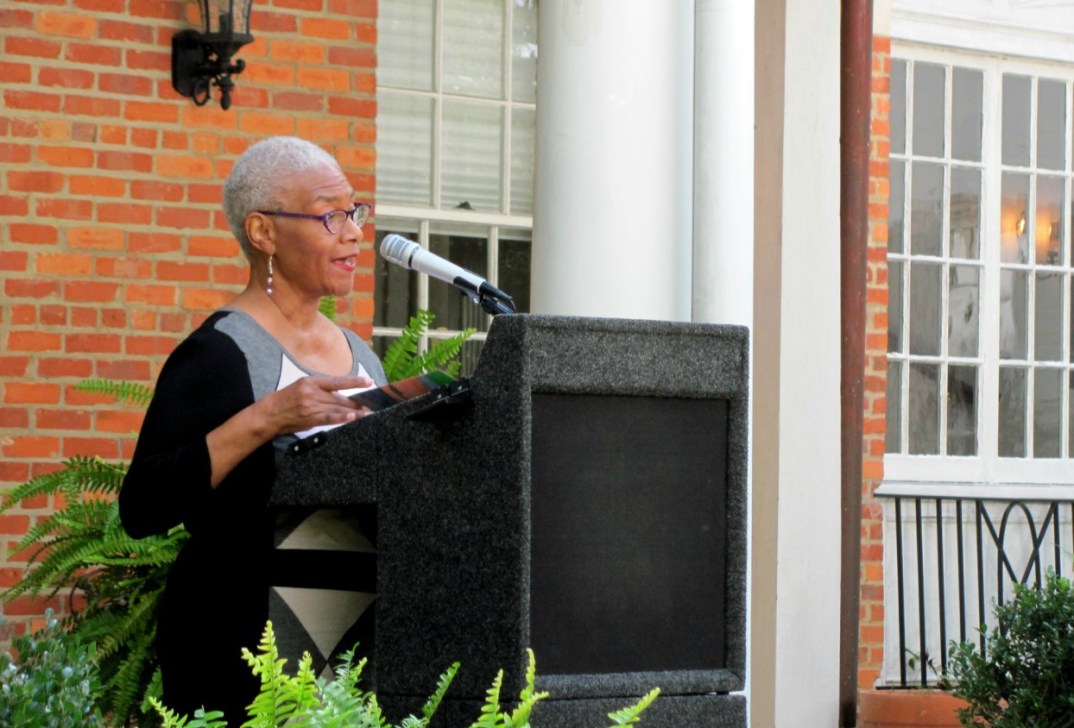North Carolina poet Jaki Shelton Green named Tar Heel of the Year finalist
North Carolina's Poet Laureate has had new doors opened to her in 2018 and now she may add one more accolade to her broad repertoire

Writer and poet Jaki Shelton Green has been having a banner year.
Earlier this year, she learned that her work earned her the distinction of becoming North Carolina’s first African American Poet Laureate. And she found out from Gov. Roy Cooper during Juneteenth, on June 19 (also her 65th birthday) so the honor was deeply meaningful and caused her to cry tears of joy.
READ MORE: Richard Overton, America’s oldest man and World War II veteran dies at 112
Green is ending a notable year on a serious high after learning that she is also a finalist for The News & Observer’s Tar Heel of the Year, the newspaper reports, which honors residents who have made indelible and lasting impressions in their community and around the state.
She will learn later this week if she’ll add the new accolade to her growing repertoire. This will be the first time four finalists will be honored.
Green explains how poetry lives in and all around her.
“I hear and see poetry in just about anything,” she said. “Inside a bird’s nest, the bottom of a teacup, a bowl of salad I’m making. I’ll find conversations in the woods, on tree limbs, in my garden. Water creates landscapes on the ground after the rain, gathering sticks and rocks and debris. A whole narrative on the ground you can see.”
Green considers herself a “nerdy overachiever with an over-active imagination who wrote on any surface that did not move.”
READ MORE: Black door-to-door salesman says cop aimed weapon at him before he could pitch his product
She shares her talents with the masses through writing workshops and readings through SistaWRITE, a group she founded. She also uses her voice and writing prowess to empower under-represented communities, something she says is deeply important to her.
“I’ve been ‘othered,’” she said. “Left out, not included, labeled an ‘angry black woman.’ So (being Poet Laureate) means a lot for so many who see themselves on the other side of certain margins, especially people of color. I honor their stories and voices and I want to create spaces where those voices are amplified. Because I’m foolish enough to believe transformation can happen, one poem at a time.”
The acclaimed writer doesn’t let any shortcomings slow her down either.
In 2011, she was diagnosed with Lyme Disease, which restricts some of her movements and the use of her hands.
But one of the most difficult moments in Green’s life came in 2009 when she lost her daughter Imani to cancer at the age of 38. Still, writing became a refuge and her child’s death inspired her to compose the 2017 book, “I Want to Undie You.”
“Her absence is a powerful presence, but we have made room for that presence,” Green said about her daughter who was one of three children.
“Her spirit was large in life and we still have visitations. I still allow myself days when I’m overwhelmed with the absence of Imani, days I really miss her. And there are days when I’m just grateful she chose me to be her vessel. I don’t know anything else to do.”
READ MORE: ‘Overjoyed’ Jemele Hill ends rollercoaster year with a ring on it
Green is a decorated writer who also earned acclaim as the first Piedmont Laureate in 2009 and she was been inducted into the North Carolina Literary Hall of Fame in 2014. In the position, her work will extend into marginalized communities.
But she also plans to delve deeply into her own history and work on a project called “Phantom Limb” and explore her roots by retracing the steps of her ancestors by traveling to the site of former Alamance County plantations where they did back-breaking work, lived and died in the 18th and 19th centuries.
“The ground screaming through the soles of my feet,” she wrote on Facebook.
She said emphatically, “I will write them alive.”
“It feels like my ancestors have invited me on a serious journey,” she said. “I want to be able to commit myself to it. I like knowing where I came from, and I want the story and ownership of it.”
